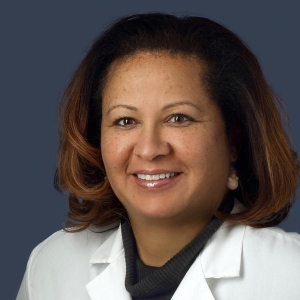People Profiles: Dr. Felicia Hamilton

Felicia Hamilton, MD, (Obstetrics and Gynecology)
“I can’t remember a time when I didn’t want to do medicine,” said Felicia Hamilton, MD, (Obstetrics and Gynecology). However, she didn’t always want to practice obstetrics and gynecology (OB/GYN). Originally, she wanted to be a cardiothoracic surgeon. A volunteer stint at a domestic violence shelter during medical school immediately changed her mind.
“I wanted to take care of women exclusively, as they take care of all of us,” she said.
Now, as the Program Director for the OB/GYN residency program at MedStar Washington Hospital Center, Dr. Hamilton is grateful for the opportunity to help teach the next generation of OB/GYN physicians.
“Being involved in the lives of so many people who will take care of women is quite an honor and a privilege,” she said. “It’s quite an honor and a privilege to take care of women as it is and there is a special honor to train those who will go out and take care of women. We are training people to go out all over the world to care of women. It’s a far-reaching and huge responsibility.”
Dr. Hamilton notes that advancing health through medical education is core to MedStar Health’s vision and strategy, and leaders across the graduate medical education (GME) program are continually making investments in resident learning. The wide scope of immense talent at MedStar Health is an asset to fellows and residents, she notes, as there are so many physicians and medical professionals to learn from and share ideas with.
“We are very resident-focused and driven. Teaching is ingrained here. GME is really involved in developing its learners and making improvements in training to achieve our educational objectives,” Dr. Hamilton said.
Dr. Hamilton’s perspective on the future of medicine has also been shaped by her time in the National Health Service Corps Scholarship Program, where she helped deliver medical care in communities without consistent access to care. She hopes that interest in medicine, and the infrastructure required to support that interest, continues to expand so that people in rural and underserved communities can access the care they deserve. “Maternal mortality and morbidity is unfortunately increasing, and that is a shame. If we do not have those providers, it will continue to be a problem,” she said.
When Dr. Hamilton is not treating patients, working with residents, serving on the Graduate Medical Education Committee (System GMEC) – or several other leadership positions throughout the MedStar Health system – she enjoys spending time with her family, including three boys and Basenji dog Louie.



